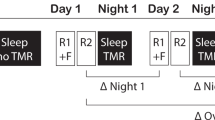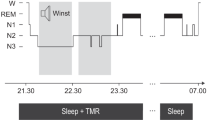Abstract
Background
It is assumed that the beneficial effect of sleep on memory relies on spontaneous reactivation of memories during sleep. We recently showed that reactivation by re-exposure to previously learned foreign vocabulary cues during sleep benefits vocabulary learning. Cueing foreign vocabulary during active or passive wakefulness at night did not improve memory, suggesting that memory benefits of cueing are specific to sleep. However, the ineffectiveness of cueing during wakefulness might also be explained by increased tiredness of the participants in this former study.
Objectives
To exclude tiredness as a confounding factor, we tested the effect of vocabulary cueing during active and passive daytime wakefulness. It was hypothesized that cueing during waking does not improve memory consolidation, even when participants are well rested.
Methods
A total of 32 subjects learned 120 Dutch–German word pairs. During a 3 h retention interval, parts of the previously learned Dutch words were replayed. Subjects of the active waking group (N = 16) were distracted from hearing the Dutch words by an n-back task, while subjects of the passive waking group (N = 16) were not distracted. After the retention interval, memory for word pairs was tested by a cued recall.
Results
Replay of Dutch words during daytime wake did not improve later memory for the German translation in either of the waking groups. We observed no difference in recall performance between cued and uncued words, neither in the active waking nor in the passive waking group.
Conclusion
Cueing Dutch words during wakefulness does not exert beneficial effects on memory, even when subjects are well rested and under full control of their cognitive capacities. This result gives further evidence that the beneficial effects of cueing are solely specific to sleep.
Zusammenfassung
Hintergrund
Es wird angenommen, dass die förderliche Wirkung von Schlaf auf die Gedächtniskonsolidierung auf spontanen Reaktivierungen zuvor gelernter Inhalte beruht. Wir konnten bereits zeigen, dass das Wiederabspielen zuvor gelernter holländischer Vokabeln im Schlaf zu einer verbesserten Gedächtnisleistung führt. Da dasselbe Vorgehen in einer aktiven und einer passiven Wachgruppe während der Nacht zu keiner Gedächtnisverbesserung führte, wurde die gedächtnisförderliche Wirkung des Wiederabspielens als schlafspezifisch interpretiert. Die fehlende Wirkung im Wachzustand könnte aber auch auf die erhöhte Müdigkeit der Versuchspersonen zurückzuführen sein.
Ziel der Arbeit
Um Müdigkeit als konfundierenden Faktor ausschließen zu können, wurden in der vorliegenden Studie die Effekte des Wiederabspielens zuvor gelernter holländischer Vokabeln während des Tages erfasst. Die Hypothese war, dass das Wiederabspielen im Wachzustand nicht zu einer Verbesserung des Gedächtnisses führt, selbst wenn die Probanden ausgeruht sind.
Material und Methoden
32 Versuchspersonen lernten 120 deutsch-holländische Wortpaare. Während einer 3-stündigen Konsolidierungsphase wurden ihnen ein Teil der zuvor gelernten holländischen Wörter wieder vorgespielt. Versuchspersonen der aktiven Wachgruppe (N = 16) führten während des Hörens der Wörter eine n-Back-Aufgabe durch, während Versuchspersonen der passiven Wachgruppe (N = 16) nicht abgelenkt wurden. Im Anschluss wurde die Gedächtnisleistung für alle holländisch-deutschen Wortpaare geprüft.
Ergebnisse
Das wiederholte Abspielen der holländischen Wörter verbesserte nicht die Gedächtnisleistung für die deutschen Übersetzungen, weder in der aktiven noch in der passiven Wachgruppe.
Diskussion
Auch wenn Probanden ausgeruht sind, führt das Abspielen von holländischen Vokabeln zu keiner gedächtnisförderlichen Wirkung. Dieses Ergebnis ist ein weiterer Beleg für die Schlafspezifität der gedächtnisförderlichen Wirkung von Reaktivierungen auf die Gedächtnisbildung.


Similar content being viewed by others
References
Antony JW, Gobel EW, O’Hare JK, Reber PJ, Paller K (2012) Cued memory reactivation during sleep influences skill learning. Nat Neurosci 15:1114–1116
Cheng S, Frank LM (2008) New experiences enhance coordinated neural activity in the hippocampus. Neuron 57:303–313
Cordi MJ, Diekelmann S, Born J, Rasch B (2014) No effect of odor-induced memory reactivation during REM sleep on declarative memory stability. Front Syst Neurosci 8:157
Deuker L, Olligs J, Fell J, Kranz T, Mormann F, Montag C, Reuter M, Elger CE, Axmacher N, Axmacher N (2013) Memory consolidation by replay of stimulus-specific neural activity. J Neurosci 33:19373–19383
Diba K, Buzsáki G (2007) Forward and reverse hippocampal place-cell sequences during ripples. Nat Neurosci 10:1241–1242
Diekelmann S, Born J (2010) The memory function of sleep. Nat Rev Neurosci 11:114–126
Diekelmann S, Büchel C, Born J, Rasch B (2011) Labile or stable: opposing consequences for memory when reactivated during waking and sleep. Nat Neurosci 14:381–386
Dudai Y (2012) The Restless Engram: Consolidations Never End. Annu Rev Neurosci 35:227–247
Dupret D, O’Neill J, Pleydell-Bouverie B, Csicsvari J (2010) The reorganization and reactivation of hippocampal maps predict spatial memory performance. Nat Neurosci 13:995–1002
Ellenbogen JM, Payne JD, Stickgold R (2006) The role of sleep in declarative memory consolidation: passive, permissive, active or none? Curr Opin Neurobiol 16:716–722
Fuentemilla L, Miró J, Ripollés P, Vilà-Balló A, Juncadella M, Castañer S, Salord N, Monasterio C, Falip M, Rodríguez-Fornells A (2013) Hippocampus-dependent strengthening of targeted memories via reactivation during sleep in humans. Curr Biol 23:1769–1775
Fuentemilla L, Penny WD, Cashdollar N, Bunzeck N, Düzel E (2010) Theta-Coupled Periodic Replay in Working Memory. Curr Biol 20:606–612
Genzel L, Kroes MCW, Dresler M, Battaglia FP (2014) Light sleep versus slow wave sleep in memory consolidation: a question of global versus local processes? Trends Neurosci 37:10–19
Gevins A, Smith ME (2000) Neurophysiological measures of working memory and individual differences in cognitive ability and cognitive style. Cereb Cortex 10:829–839
Gupta AS, van der Meer MAA, Touretzky DS, Redish AD (2010) Hippocampal Replay Is Not a Simple Function of Experience. Neuron 65:695–705
Hasselmo ME (2006) The role of acetylcholine in learning and memory. Curr Opin Neurobiol 16:710–715
Ji D, Wilson M (2007) Coordinated memory replay in the visual cortex and hippocampus during sleep. Nat Neurosci 10:100–107
Kudrimoti HS, Barnes CA, McNaughton BL (1999) Reactivation of hippocampal cell assemblies: effects of behavioral state, experience, and EEG dynamics. J Neurosci 19:4090–4101
Lansink CS, Goltstein PM, Lankelma JV, Joosten RNJMA, McNaughton BL, Pennartz CMA (2008) Preferential reactivation of motivationally relevant information in the ventral striatum. J Neurosci 28:6372–6382
Lansink CS, Goltstein PM, Lankelma JV, McNaughton BL, Pennartz CMA (2009) Hippocampus leads ventral striatum in replay of place-reward information. PLoS Biol 7(8):e1000173
Macmillan NA, Creelman CD (2005) Detection theory: a user’s guide. Cambridge University Press, Cambridge, UK
Margoliash D (2010) Sleep, learning, and birdsong. ILAR J Natl Res Counc Inst Lab Anim Resour 51:378–386
McGaugh JL (2000) Memory – a century of consolidation. Science 287:248–251
Nader K, Hardt O (2009) A single standard for memory: the case for reconsolidation. Nat Rev Neurosci 10:224–234
O’Neill J, Pleydell-Bouverie B, Dupret D, Csicsvari J (2010) Play it again: reactivation of waking experience and memory. Trends Neurosci 33:220–229
O’Neill J, Senior TJ, Allen K, Huxter JR, Csicsvari J (2008) Reactivation of experience-dependent cell assembly patterns in the hippocampus. Nat Neurosci 11:209–215
Oudiette D, Antony JW, Creery JD, Paller KA (2013) The role of memory reactivation during wakefulness and sleep in determining which memories endure. J Neurosci 33:6672–6678
Oudiette D, Paller KA (2013) Upgrading the sleeping brain with targeted memory reactivation. Trends Cogn Sci 17:142–149
Pavlides C, Winson J (1989) Influences of hippocampal place cell firing in the awake state on the activity of these cells during subsequent sleep episodes. J Neurosci 9:2907–2918
Peigneux P, Laureys S, Fuchs S, Collette F, Perrin F, Reggers J, Phillips C, Degueldre C, Del Fiore G, Aerts J, Luxen A, Maquet P (2004) Are spatial memories strengthened in the human hippocampus during slow wave sleep? Neuron 44:535–545
Peigneux P, Orban P, Balteau E, Degueldre C, Luxen A, Laureys S, Maquet P (2006) Offline persistence of memory-related cerebral activity during active wakefulness. PLoS Biol 4:647–658
Pennartz CM, Lee E, Verheul J, Lipa P, Barnes C, McNaughton BL (2004) The ventral striatum in off-line processing: ensemble reactivation during sleep and modulation by hippocampal ripples. J Neurosci 24:6446–6456
Peyrache A, Khamassi M, Benchenane K, Wiener SI, Battaglia FP (2009) Replay of rule-learning related neural patterns in the prefrontal cortex during sleep. Nat Neurosci 12:919–926
Rasch B, Born J (2013) About sleep’s role in memory. Physiol Rev 93:681–766
Rasch B, Büchel C, Gais S, Born J (2007) Odor cues during slow-wave sleep prompt declarative memory consolidation. Science 80(315):1426–1429
Rihm JS, Diekelmann S, Born J, Rasch B (2014) Reactivating memories during sleep by odors: odor specificity and associated changes in sleep oscillations. J Cogn Neurosci 26:1806–1818
Rudoy JD, Voss JL, Westerberg CE, Paller KA (2009) Strengthening individual memories by reactivating them during sleep. Science 80(326):1079
Schönauer M, Geisler T, Gais S (2013) Strengthening procedural memories by reactivation in sleep. J Cogn Neurosci 26(1):1–11
Schreiner T, Rasch B (2014) Boosting vocabulary learning by verbal cueing during sleep. Cereb Cortex doi:10.1093/cercor/bhu139
Staresina BP, Alink A, Kriegeskorte N, Henson RN (2013) Awake reactivation predicts memory in humans. Proc Natl Acad Sci U S A 110:21159–21164
Sterpenich V, Schmidt C, Albouy G, Matarazzo L, Vanhaudenhuyse A, Boveroux P, Degueldre C, Leclercq Y, Balteau E, Collette F, Luxen A, Phillips C, Maquet P (2014) Memory reactivation during rapid eye movement sleep promotes its generalization and integration in cortical stores. Sleep 37:1061–1075
Stickgold R, Walker MP (2013) Sleep-dependent memory triage: evolving generalization through selective processing. Nat Neurosci 16:139–145
Tambini A, Davachi L (2013) Persistence of hippocampal multivoxel patterns into postencoding rest is related to memory. Proc Natl Acad Sci U S A 110:19591–19596
Tononi G, Cirelli C (2014) Sleep and the price of plasticity: from synaptic and cellular homeostasis to memory consolidation and integration. Neuron 81:12–34
Wilson MA, McNaughton BL (1994) Reactivation of hippocampal ensemble memories during sleep. Science 265:676–679
Wixted JT (2004) The psychology and neuroscience of forgetting. Annu Rev Psychol 55:235–269
Acknowledgments
We thank Nicola Biesold and Carolin Kirscht for their help in data collection.
Funding
This work was supported by a grant from the Swiss National Foundation (PP00P1_133685) and the Clinical Research Priority Program “Sleep and Health” of the University of Zurich.
Author information
Authors and Affiliations
Corresponding author
Ethics declarations
Conflict of interest
T. Schreiner and B. Rasch state that there are no conflicts of interest.
All procedures followed were in accordance with the ethical standards of the responsible committee on human experimentation (institutional and national) and with the Helsinki Declaration of 1975 (in its most recently amended version). Informed consent was obtained from all patients included in the study.
Rights and permissions
About this article
Cite this article
Schreiner, T., Rasch, B. Cueing vocabulary in awake subjects during the day has no effect on memory. Somnologie 19, 133–140 (2015). https://doi.org/10.1007/s11818-015-0005-9
Published:
Issue Date:
DOI: https://doi.org/10.1007/s11818-015-0005-9




